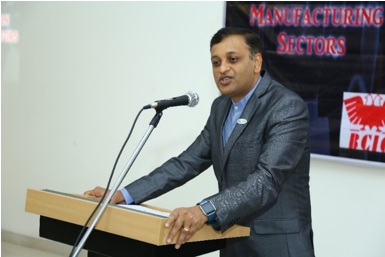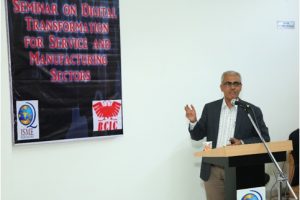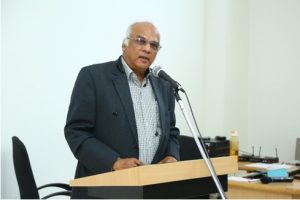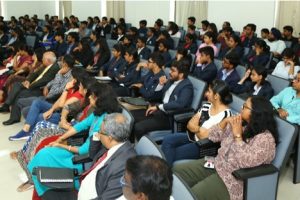The BCIC under the aegis of its Industry-Institute Interface (3i) Expert Committee organized the 2nd in the series of the knowledge sharing Technical Lecture series over a Seminar on Digital Transformation for Service and Manufacturing Sectors hosted by the International School of Management Excellence (ISME).
Mr. Nitin Garg, Co-Chairman, Industry-Institute Interface Expert Committee, BCIC and Founder and Director, International School of Management Excellence (ISME) delivering his Welcome Address
In his Welcome Address Mr. Nitin Garg said that the Seminar is organized with the objective to share insight on the digital transformation required by the manufacturing and services sector through the combination of the processes enhanced with new advancing technologies driving forward. The Process of digital transformation is connecting people and tech to deliver business goals seamlessly in the present world, he further added.
Dr. K N Subramanya, Chairman, Industry-Institute Interface Expert Committee, BCIC and Principal and Professor, Dept. of Industrial Engineering and Management, R V College of Engineering during his introductory Remarks
Dr. Subramanya said that though the present generation are subject to constraints in the formal education space, digital transformation will give more flexibility to help switch to the Education 4.0. He gave an overview on the activities of the various Centres of Excellence constituted at RV College of Engineering including developing employable human resource to meet the challenges in the field of IoT.
He said that while it comes as no surprise, that manufacturers are waking up to the opportunities and threats of digitization, the ways people and organizations use information has shifted dramatically and advanced analytics and artificial intelligence are giving us new abilities to draw insights from large amounts of data.
Mr. A N Chandramouli, Past President, BCIC and CEO, ANCM Management Consultants during his presentation
Mr. A N Chandramouli, Past President, BCIC and CEO, ANCM Management Consultants said that the explosion in data and new computing capabilities along with advances in areas such as artificial intelligence, automation and robotics, additive technology, and human-machine interaction—are unleashing innovations that will change the nature of manufacturing itself.
He said digital transformation meant of deploying Digital Technologies including the Internet for the purpose of improving efficiency and effectiveness of Manufacturing & Industrial systems towards higher levels of Customer Satisfaction and Operational Excellence throughout the Value Chain of business through Product Life Cycle Management.
With the main stakeholders of digital transformation viz., Tech Providers – IT Enablers – End Users, the confluence of IT and OT would benefit the whole world by deploying digital transformation for effectiveness and efficiency t and lifting equipment, towards higher levels of customer satisfaction leading to societal transformation.
In his presentation on Digital Transformation in capital Goods Sector, he comprehensively covered on:
· 10 subsectors of the Capital Goods comprising Machine Tools, Power and electrical equipment, Process plant machinery, Textile machinery, Plastic, Paper and rubber machinery, Light engineering goods, Earthmoving construction and mining equipment, material handling and lifting equipment, agriculture machinery and Industrial automation
· Product life cycle management with digitalisation
· Using data is the main objective of smart manufacturing
· New age technology and connected processes are changing the execution of tasks in industry and skill metrics. Many Job Roles in manufacturing sector is changing very dynamically in India and rest of the world.
· Operational excellence in the entire value chain & real-time proactive performance
· Interlinking of physical and cyber world
· Change in the role of companies including qualifications and skills to have digital transformation
· Future job roles – Industry 4.0
· Engineering and vocational education needs to address on digital transformation
· Digital India Mission – Skill India Mission – Make in India Mission
· Benefits of digital transformation: cost optimization; new opportunities; greater operational efficiency; derive benefits from government mandates and incentives
The Inaugural Session was followed by Panel Discussions on the theme of the Seminar.
Panel Discussion on Digital Transformation for Service Sector
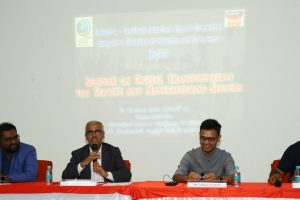
Highlights:
· Service sector to leverage digital platforms to increase collaboration and provide insights across the product lifecycle
· Service providers are rebooting their approach in product and process innovation to scale new opportunities.
· To keep in pace with the changing customer perception, digitization through IOT, AI/ML, Blockchain, Cloud, Mobility, AR, VR is the only answer to address the challenges of the digital supply chain
· Concepts from the past reinvented for the concepts of the future; Flywheel concept of cost, demand and supply in relation to digital transformation
· Education 4.0: Digital technology in the education sector empowering / upskilling people via digital skills – Professionals can access live virtual classrooms and self-paced video courses that combine seamless training experience and world-class instructors with state-of-the-art labs and course content
· Digital transformation calls for operation excellence in entire value chain
· The leading global e-learning companies working through the Digital Transformation & Future of Tech Jobs in key domains – Data Science, Artificial Intelligence, Cloud Computing, Cyber Security and Digital Project Management are transforming industries across the world
· Education sector though subject to constraints in formal education space but digital transformation will give more flexibility and help to switch to the Education 4.0
· Accelerate the learning ecosystem which is evolving rapidly focused towards delivering digital transformation successfully
Panel Discussion on Digital Transformation for Manufacturing Sector
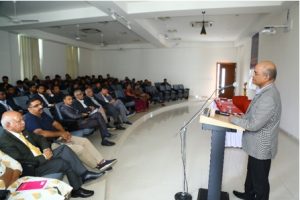
Mr. Jagannath V, Business Head, m2nxt, A BFW Subsidiary during his presentation
In his presentation Mr. Jagannath highlighted on the following:
· About m2nxt: Solution provider in the area of machine tools, providing complete offerings for Smart Manufacturing using both the cyber and physical automation and solutions.
· Digitization and automation are the next big disruption in the manufacturing sector.
· Overview of IRIS Connected Machines – Cyber Physical Systems
· Cast Study – video of process matrix mapping
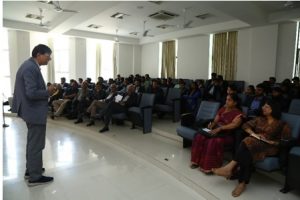
Mr. T R Parasuraman, Sr. Vice President, BCIC and President and Whole Time Director, Toyota Industries Engine India
Mr. Parasuraman, in his presentation highlighted on
- 3D Printing changing the scenarios in the world
- Virtual manufacturing
- Case study of Robot Manufacturing Robot in Japan
- Roadmap for sustaining performance through IoT vs. Real Time Monitoring; predictive maintenance through IoT.
- Many large manufacturers using data analytics to optimize factory operations, boosting equipment utilization and product quality while reducing energy consumption. With new supply-network management tools, factory managers have a clearer view of raw materials and manufactured parts flowing through a manufacturing network, which can help them schedule factory operations and product deliveries to cut costs and improve efficiency.
- By data mining, new insights are gained into the failure characteristics of major equipment modes and making continuous improvements in reliability; the organization can use monitoring and predictive maintenance, in conjunction with process controls and automated material tracking made possible with big data analysis, to drive increase in production without a substantial increase in operational costs.
- Digital manufacturing gaining significantly competitive advantage by harnessing the capabilities of workers, designers, managers, and suppliers, speeding the pace of innovation, lowering the costs of production and maintenance.
- Advances in virtual and augmented reality, next-level interfaces, advanced robotics, and additive manufacturing are all opening the gates to digital disruption. And in the coming future, digital manufacturing technologies would allow companies to connect physical assets by a “digital thread”—unleashing a seamless flow of data across the value chain that will link every phase of the product life cycle, from design, sourcing, testing, and production to distribution, point of sale, and use.
A section of the audience
Mr. Chandramouli summed up the proceedings:
- Digital-manufacturing technologies will transform every link in the manufacturing value chain, from research and development, supply chain, and factory operations to marketing, sales, and service.
- Digital connectivity will unlock enormous value and change the manufacturing landscape.
- Convergence of physical and the digital worlds and building intelligent connections between machines, products, people, and suppliers that drive rich customer value through reduced time-to-market, mass customization, product innovation, end-to-end industrial efficiency and enhanced customer service to improve profitability and competitive agility.
- Digital transformation would improve the digital maturity of core manufacturing functions and to adopt exponential technologies and industrial cybersecurity that can turn manufacturing efficiencies into a sustainable competitive advantage.
Prof. HS Mishra, HR Faculty & Head Placements, ISME proposed a hearty vote of thanks to all the speakers and participants.



